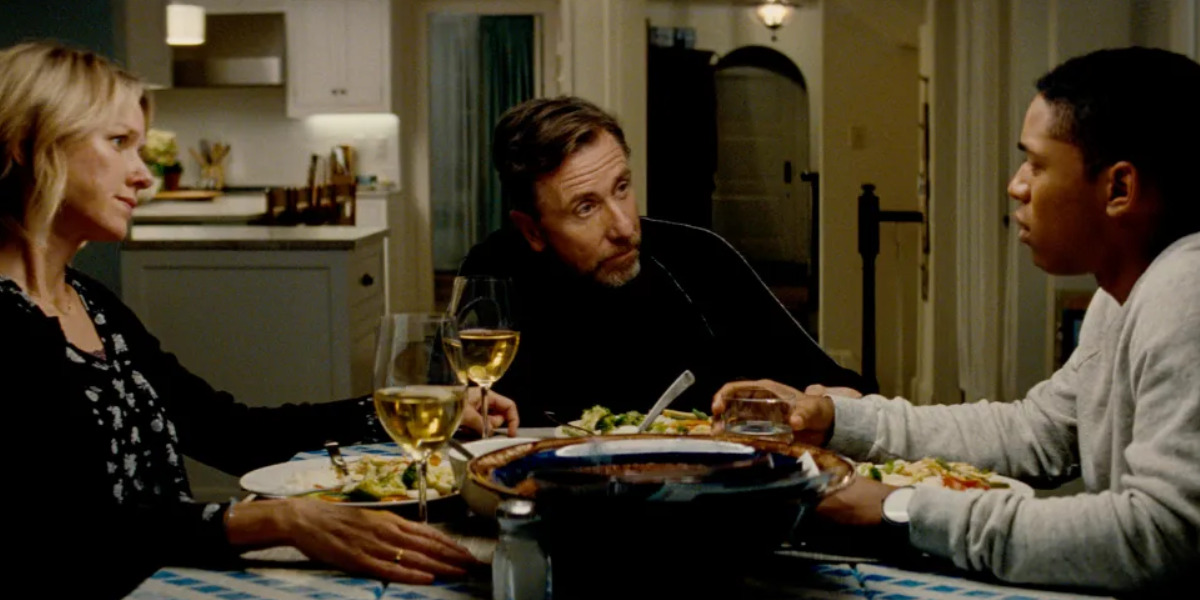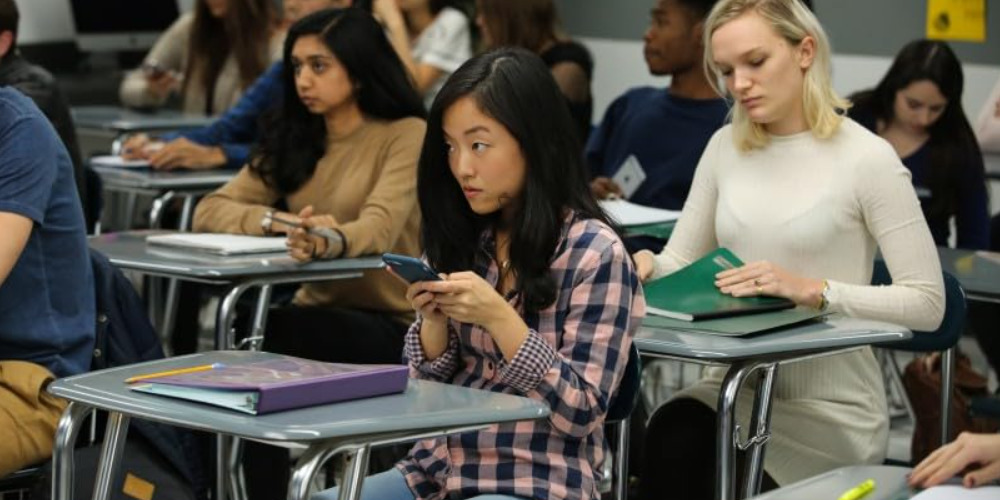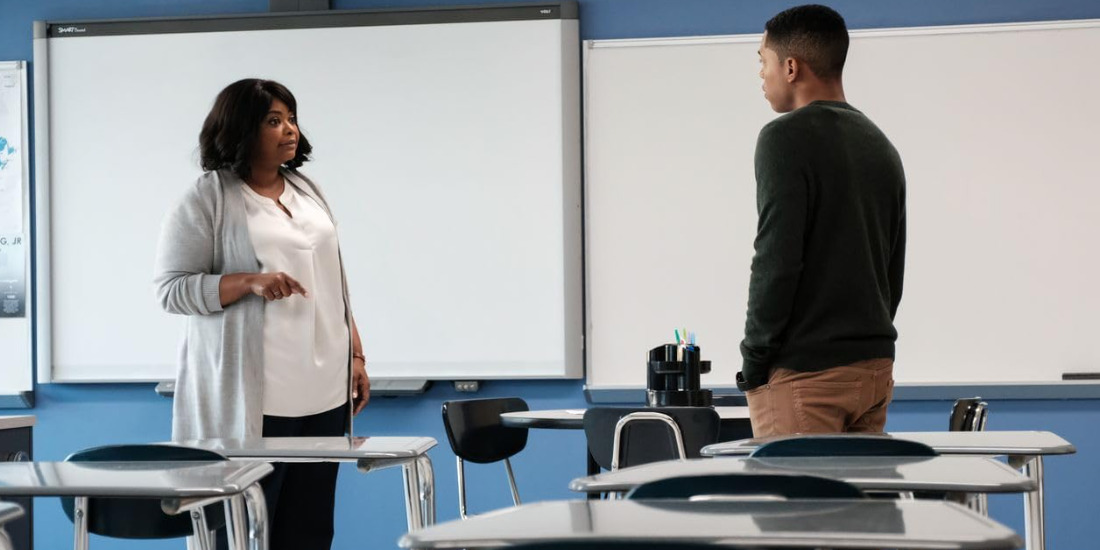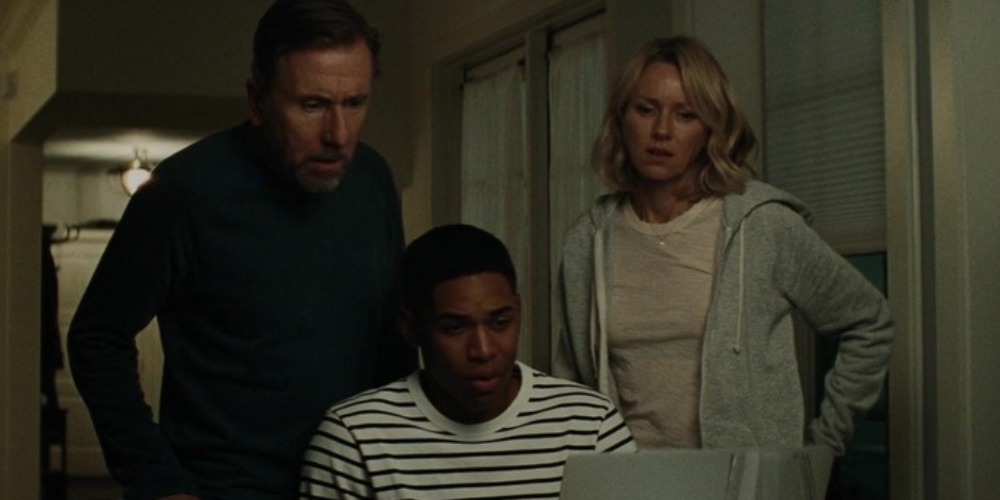Julius Onah’s ‘Luce’ is a drama film that tells the story of its titular character, Luce Edgar, a Black student with a stainless record who deals with people’s perception of him once he steps out of line from their expectations. As a promising valedictorian candidate, track star, and proficient debater, Luce has a list of accomplishments to show for his model academic career. Yet, after he writes a paper that his history teacher, Harriet Wilson, finds disturbing, the boy’s integrity and character are brought into question.
Thus, while Luce battles the complications of the same while actively holding a grudge against his teacher, his adoptive white parents, Amy and Pete, must confront the idea that they don’t know their son as well as they thought. As a thriller devoid of genre cliches, ‘Luce’ depends on the narrative’s ambiguity and social intensity to drive its plot forward. As such, the film remains cryptic until the end, leaving the audience with many questions. SPOILERS AHEAD!
Luce Plot Synopsis
After Amy and Pete adopted 10-year-old Luce from the war zone in Eritrea, where he was brought up as a child soldier, they went through an extensive therapy process to incorporate the kid into his new reality and deal with his lingering psychological issues. Now, in his late teens, Luce is an ace student, beloved by his peers and praised by his teachers. Therefore, Amy is taken aback when she gets called in by Luce’s history teacher, Harriet Wilson, to discuss a concerning matter.

As per Harriet’s latest assignment, students had to write a paper in the voice of a historical figure of their choosing. Consequently, Luce turned in a paper about Frantz Fanon, a Pan-African revolutionary who advocated violence as the political solution for colonization. Given Luce’s background as a child soldier, his paper didn’t sit well with Harriet, who decided to look through his locker. Although Amy doesn’t take well to her kid’s invasion of privacy, she’s shell-shocked when Harriet pulls out a bag of illegal fireworks retrieved from Luce’s locker.
As a result, Amy and Pete discuss the situation, with each remaining lost in their own way. Even though upon Luce’s return from school, neither brings up the paper or the fireworks, the topic of Harriet emerges around the dinner table. Luce has a distinct dislike for the teacher due to her tokenizing tendencies, where she often treats minority students as symbols and political statements. As an example, Luce puts forward Stephanie Kim’s case, who has become Harriet’s poster girl for topics of women’s suffering because of some unprovable rumors about her.
While the explosives remain undiscussed, Luce still discovers them, alongside the paper, and decides to continue feigning innocence about it to his parents. Nevertheless, the next day at school, while discussing his upcoming debate with the principal and Ms. Wilson, the kid subtly alludes to the teacher’s invasive action while retaining plausible deniability. Furthermore, in a one-on-one conversation, Luce acts oblivious but subtly brings up fireworks, which Harriet sees as a threat.
For the same reason, Harriet contacts Pete about his son’s issue, an act not taken too kindly by Amy. Yet, Pete maintains that they shouldn’t be dismissive of the idea that Luce can be culpable. As a result, Pete confronts his son head-on about the fireworks. In response, Luce tells his parents that his friend group had a tendency to treat each other’s lockers as a communal space. Consequently, the fireworks could belong to anyone.
No longer sure what to think, Amy decides to contact Stephanie to learn more about Harriet and scope out if she has a vendetta against Luce or not. Although Stephanie is reluctant to discuss anything with Luce’s mother, who didn’t even know about their past dating history, she still tells her about an incident at a party where she was sexually assaulted in her drunken state by unknown boys. Even though the girl insists that Luce wasn’t one of the boys, Amy remains uncertain.
Meanwhile, as tensions grow across the Edgar household, Harriet faces her own personal issues due to her sister Rosemary’s mental illness issues. The problem grows until Rose shows up at Harriet’s school during a breakdown and causes a scene that ends with the woman publicly undressing herself. The same night, Harriet finds slurs written across her house window. Additionally, Stephanie, who has previously shown a dislike for the teacher, shows up at her door to talk to her about her sexual assault at Luce’s hands.
Luce Ending: Why Does Stephanie Lie To Harriet?
Even though Stephanie is vehemently against even entertaining the idea that Luce could have assaulted her on the night of the party, she shares a different story with Harriet. As such, the girl’s actions remain suspicious from the start. Nevertheless, unaware of the student’s vocal dislike for her, Harriet believes the girl and meets up with the principal to discuss Luce’s case. She points out every indiscretion by the student and accuses him of vandalizing her house. Due to the circumstantial nature of all these events, Stephanie’s story remains the final tool in the teacher’s arsenal.

Since accusations of sexual assault suggest Luce has committed an actual crime, the Principal, Dan, decides to have a meeting with the Edgars and Harriet. Even though things are tense within the Edgar household, given their recent interpersonal arguments, they enter the discussion as a team with the intention of defending Luce. Likewise, Dan is reluctant to throw harsh accusations at the student due to his stellar record. All in all, Harriet’s arguments continue to work against her since she doesn’t have any evidence against Luce, who maintains his innocence while simultaneously apologizing for his behavior.
Nonetheless, Harriet sees through his fake apologies as he attempts to shoulder the blame on his stress of schoolwork as well as Harriet’s own personal problems. Finally, Harriet decides to pull out the big guns and leaves to bring Stephanie to testify against Luce, only to find the girl missing. As a result, when Harriet returns empty-handed, she seals her perception as a teacher in the wrong who seems to have a vendetta against Luce.
Given Harriet’s pattern of reaching out to different authority figures— Luce’s mother, father, and principal— to repeatedly bring attention to his alleged wrongdoings, she seamlessly comes across as a teacher on a witch hunt against a star student. Furthermore, for Harriet’s every allegation, Luce has an effortless alibi that secures his innocence in the matter. Thus, Stephanie’s absence only proves the same argument.
Earlier in the film, we catch glimpses of Luce’s conversations with his friends, especially Stephanie and DeShaun, wherein he seems to be hatching a scheme. Earlier in the school year, DeShaun Meeks was kicked off the school track team after Harriet found weed in his locker. As a result, she effectively took away the boy’s sole chance at success, his scholarship, which ruined his life. Meanwhile, other students who also dabbled with marijuana, including Luce, never faced any trouble for it.
DeShaun’s situation mirrors Stephanie, whose assault at a random high school party was turned into gossip fodder, which Harriet later used as a symbol to enforce the significance of speaking out against mistreatment among her female students. Even though the teacher’s messaging isn’t flawed, Harriet continuously shines a light on the girl’s traumatic incident by using it as her tether. Thus, the attention is constantly on Stephanie, who would rather just forget about the event.
Moreover, since Stephanie had been drinking underage at the time, she couldn’t stand up for herself and had to face the brunt of the rumors head-on. Therefore, she agrees to participate when Luce brews up the plan to prove Harriet wrong by painting her recent actions in the worst light.
Did Luce Set Harriet Up?
From their first interaction, Luce and Harriet share an air of contention between them. Despite putting on a polite face in person, Luce expresses his ill feelings toward Harriet behind the teacher’s back to his parents. As seen time and time again, Harriet has a tendency to subtly single out minority students in socio-politically charged conversations to use them as an example. For the same reason, Luce believes the woman uses students as tokens to represent their entire minority community instead of their individual selves.

For instance, in a class discussion about the Confederacy and its contemporary relevance, DeShaun, a Black boy, becomes a student who needs to pay extra attention. Likewise, in conversation about gender inequality in the Middle East, Stephanie becomes the standard for women’s need to speak out. As such, Luce is Harriet’s poster boy as a Black stellar student who moved to America from a complicated foreign land.
While Harriet’s philosophy would have been only mildly annoying and inconvenient otherwise, her tendency to intervene in students’ businesses within the school halls pushes Luce and his friends to the edge. Her incriminating crime remains going through DeShaun’s locker and reporting his illegal marijuana possession. Where other students like Kenny Orlicki and even Luce get away with smoking weed, DeShaun has to pay the price for it with his only chance at future success.
All his life, Luce has had to strive for perfection to just be accepted. While Orlicki can get away with weed and worse, Luce has to think about the consequences of smelling like marijuana on a non-descript night. Where most other children would have been a blessing to Amy and Pete for just being children in their lives, Luce has to overcome his past trauma and achieve mounting success to impress them. Therefore, something snaps in him when Harriet holds every other Black kid to a picture-perfect standard and uses him as her perfect example.
Thus, the core conflict between Luce and Harriet remains the generational gap between their perceptions of the fight for equality. Harriet subscribes to respectability politics and plays the society’s game by striving for the approval of those who need Black people to be extraordinary to accept them. In contrast, Luce argues that Black people, alongside other minority groups, don’t have to hold themselves to an impossible standard to simply exist.
As a classic generational gap effect, Harriet remains firm in her belief that since they exist in society, they have to conform to it, however bitter it may be. Once America prescribes you a box based on arbitrary traits, such as your race, gender, and everything else, you must find ways to succeed within that tiny box, even if it inevitably prevents others from doing the same. In turn, Luce can’t forgive her for enforcing the same box on others. For instance, while other students are free to write about historical figures, such as Fidel Castro, without it being a reflection of their character, Luce isn’t afforded the same privilege.
Therefore, Luce comes up with the plan to take Harriet down for what she did to DaShaun. After Amy refuses to ever have seen physical proof of the fireworks Harriet claimed to find in Luce’s locker, it conveniently unlocks the last step in the boy’s plan. The following night, fireworks go off inside Harriet’s classroom, setting part of the school on fire. As a result, Harriet is suspended with promises of an internal investigation against her by the school board.
Even though Luce has an alibi for the night, Amy can’t deny that her son likely had a hand in the event as she frantically looks for the fireworks she hid inside the house. Furthermore, the mother-son’s following conversation, heartfelt if cryptic, maintains the unsaid implication that each knows the event’s truth but ignores it in favor of a second chance, as symbolized by Dennis The Fish.
Who Put The Fireworks In Luce’s Locker?
The film opens with a shot of a faceless person depositing a brown paper bag inside a locker. The scene’s significance comes to light as the plot progresses, with the fireworks becoming the central tool in the following events’ incitement. Thus, the mystery around them persists.

Nonetheless, the film remains tight-lipped about the truth behind the mysterious fireworks. The narrative focuses on highlighting how stereotypes and preconceived biases over arbitrary details shape one’s perception of others. Therefore, the fireworks’ mystery works in a similar manner and urges the audiences to look within their own prejudices to come to different conclusions and examine their reasonings.
For instance, if we consider Luce as the owner of the fireworks, we have to accept the fact that his character is a sociopath who plans a grand scheme based on lies to ruin his teacher’s life in an act of revenge. However, we can also believe his account and assume the fireworks belonged to one of his friends. Consequently, Luce’s character becomes someone who took advantage of a situation and retaliated against a teacher for making wrongful assumptions about him due to his background.
Or perhaps Stephanie orchestrated the entire event to get back on Harriet, a teacher who used her sexual assault as a lesson callously taught. Whatever version of the truth the viewers choose to believe will force them to evaluate their own beliefs and why they lead to certain assumptions. Ultimately, the film isn’t about getting to the bottom of Luce’s battle against Harriet. Instead, it’s a study examining the social factors, pressures, and expectations that led to the battle to begin with.
Read More: Best Mom Son Movies on Netflix


You must be logged in to post a comment.